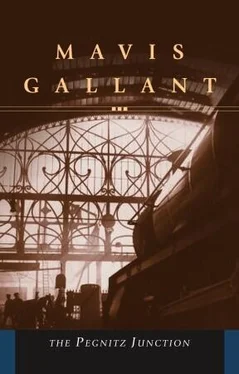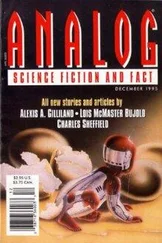Having aired the room, and frozen it, Ernst lights another cigarette. He is going home. In Willi’s scrapbook he turns over unpasted clippings about the terrorist trials in Paris in 1962. Two ex-Legionnaires, deserters, were tried — he will read to the end, if he can keep awake. Two ex-Legionnaires were shot by a firing squad because they had shot someone else. It is a confusing story, because some of the clippings say “bandits” and some say “patriots.” He does not quite understand what went on, and the two terrorists could not have understood much, either, because when the death sentence was spoken they took off their French decorations and flung them into the courtroom and cried, “Long Live France!” and “Long Live French Algeria!” They were not French, but they had been in the Legion, and probably did not know there were other things to say. That was 1962 — light-years ago in political time.
Ernst is going home. He has decided, about a field of daffodils, My Country. He will not be shot with “Long Live” anything on his lips. No. He will not put on a new uniform, or continue to claim his pension, or live with a prostitute, or become a night watchman in Paris. What will he do?
When Ernst does not know what to do, he goes to sleep. He sits on the floor near the gas heater with his knees drawn up and his head on his arms. He can sleep in any position, and he goes deeply asleep within seconds. The room is as sealed as a box and his duffelbag an invisible threat in a corner. He wades in the water of a flooded cellar. His pocket light is soaked; the damp batteries fail. There is another victim in the cellar, calling “Mutti,” and it is his duty to find him and rescue him and drag him up to the light of day. He wades forward in the dark, and knows, in sleep, where it is no help to him, that the voice is his own.
Ernst, on his feet, stiff with the cold of a forgotten dream, makes a new decision. Everyone is lying; he will invent his own truth. Is it important if one-tenth of a lie is true? Is there a horror in a memory if it was only a dream? In Willi’s shaving mirror now he wears the face that no superior officer, no prisoner, and no infatuated girl has ever seen. He will believe only what he knows. It is a great decision in an important day. Life begins with facts: he is Ernst Zimmermann, ex-Legionnaire. He has a ticket to Stuttgart. On the twenty-eighth of January, in the coldest winter since 1880, on the rue de Lille, in Paris, the child beaten by his mother cries for help and calls “Maman, Maman.”

Though my Aunt Charlotte, my sad mother, my Uncle Theo, and I all live together, and can see each other as often as we need to, when Uncle Theo has something urgent to tell me he comes here, to the Civic Tourist and Travel Bureau. He gets in line, as if he were waiting to ask about the Bavarian Lakes and Mountains Program or the Ludwig the Second Bus Circuit. He slides close to the counter. I glance over, and suddenly have to look down; Uncle Theo is so small he is always a surprise. He grins, scared to death of me. He is totally bald now, not a hair to stretch sideways. He looks like a child’s drawing of two eyes and a smile. After a furtive trip to Berlin last summer he edged along the queue to say he had called on my father, who is his brother and Aunt Charlotte’s brother, too.
“Hilde, everything has gone wrong for him,” said Uncle Theo, gripping the counter as if that might keep me from sending him away. “Do you remember how he couldn’t stand cigarette smoke? How none of you could smoke when he was around?” Do I remember? It was one of the reasons my younger brother cleared out, leaving me to support half the household. “Well, she smokes all the time,” said Uncle Theo. “She blows smoke in his face and so do her friends. She even eggs them on.”
“Her friends,” I repeated, writing it down. My expression was open but reserved. To anyone watching, Uncle Theo is supposed to be a client like any other.
“Low friends,” said Uncle Theo. “Low Berliners in shady Berlin rackets. The kind of people who live in abandoned stores. No curtains, just whitewashed windows.” At the word “shady” I did look as if I had seen my uncle somewhere before, but he is one more respectable survivor now, a hero of yesterday. “Ah, your poor father’s kitchen,” he went on lamenting. “Grease on the ceiling that deep,” showing thumb and finger. “They’re so down they’ve had to rent the parlour and the bedroom. They sleep on a mattress behind the front door.”
“He’s got what he wanted.”
“Well, it had been going on between them for a long time, eh?” Embarrassment made him rise on his toes; it was almost a dance step. “After fifteen years she and your mother joined up and told him to choose. Your mother didn’t understand what she was doing. She thought it was like some story on television.”
My father left us five winters ago, at the age of sixty-three. I still have in mind the sight of my mother in a faint on the sofa and my Aunt Charlotte with an apron over her face, rocking and crying. I remember my Uncle Theo whispering into the telephone and my Aunt Charlotte taking the damp corner of her apron to wipe the leaves of the rubber plant. I came home from work on a dark evening to find this going on. I thought my Uncle Theo had been up to something. I went straight to my mother and gave her a shake. I was not frightened — she faints at will. I said, “Now you see what Uncle Theo is really like.” She opened her eyes, sniffling. Her nylon chignon, which looks like a pound of butter sometimes, was askew on the pillow. She answered, “Be nice to poor Theo, he never had a wife to look after him.” “Whose fault is that?” I said. I did not know yet that my father had gone, or even that such a thing might ever happen. Now it seems that my mother had been expecting it for fifteen years. A lifetime won’t be enough to come to the end of their lies and their mysteries. I am the inspector, the governess, the one they tell stories to. And yet they depend on me! Without me they would be beggars, outcasts! Aunt Charlotte and my mother would wash windows in schoolhouses; they would haul buckets of dirty water up the stairs of office buildings; they would stand on vacant lots selling plastic combs and miniature Christmas trees!
My Uncle Theo began describing her — that other one. His face was as bright as if he were reciting a list of virtues: “I never did understand my brother. She has no taste, no charm, no looks, no culture, no education. She has a birthmark here,” touching the side of his nose.
“I’m busy, Uncle Theo.”
“We must send him money,” he said, getting round to it.
“Well?” I said to the person next in line, over Uncle Theo’s head.
“Hilde, we must send the poor old man money,” he said, hanging on the counter. “A little every month, just the two of us.” Uncle Theo thinks everyone else is old and poor. “Hilde — he’s a night porter in a hospital. He doesn’t like anything about the job. He can’t eat the food.”
Sometimes Uncle Theo will come here to intercede for our neighbours, having heard I have started legal action again. We have East German refugees in the next apartment — loud, boorish Saxons, six to a room. They send everything through the wall, from their coarse songs to their bedbugs. Long ago they were given a temporary housing priority, and then the city forgot them. The truth is these people live on priorities. They have wormed their way into everything. Ask anyone who it is that owns the laundries, the best farmlands, the electronics industry; you will always get the same answer: “East German refugees.” At one time a popular riddle based on this subject went the rounds. Question: “Who were the three greatest magicians of all time?” Answer: “Jesus, because he turned water into wine. Hitler, because he turned Jews into soap. Adenauer, because he turned East German refugees into millionaires.” Very few people can still repeat this without a mistake. Only two per cent of the readers of our morning paper still consider Hitler “a great figure.” My own sister-in-law cannot say who Adenauer was, or what made him famous. As for Jesus, even I have forgotten what that particular miracle was about. A story that once made people laugh now brings nothing but “Who?” or “What?” or even “Be careful.” It is probably best not to try to remember.
Читать дальше













